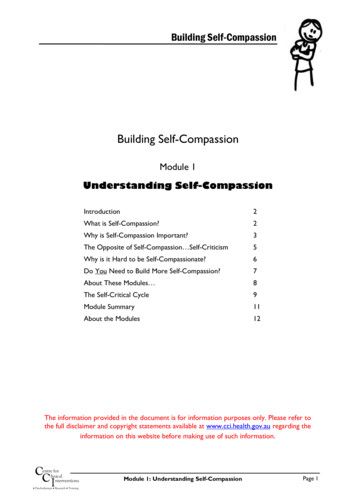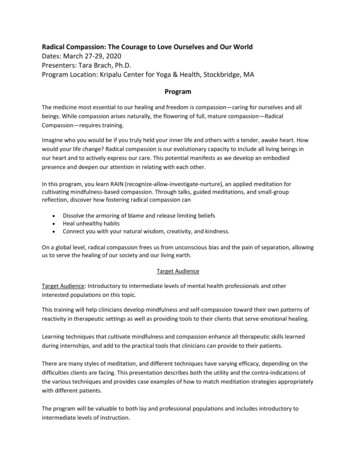
Transcription
Radical Compassion: The Courage to Love Ourselves and Our WorldDates: March 27-29, 2020Presenters: Tara Brach, Ph.D.Program Location: Kripalu Center for Yoga & Health, Stockbridge, MAProgramThe medicine most essential to our healing and freedom is compassion—caring for ourselves and allbeings. While compassion arises naturally, the flowering of full, mature compassion—RadicalCompassion—requires training.Imagine who you would be if you truly held your inner life and others with a tender, awake heart. Howwould your life change? Radical compassion is our evolutionary capacity to include all living beings inour heart and to actively express our care. This potential manifests as we develop an embodiedpresence and deepen our attention in relating with each other.In this program, you learn RAIN (recognize-allow-investigate-nurture), an applied meditation forcultivating mindfulness-based compassion. Through talks, guided meditations, and small-groupreflection, discover how fostering radical compassion can Dissolve the armoring of blame and release limiting beliefsHeal unhealthy habitsConnect you with your natural wisdom, creativity, and kindness.On a global level, radical compassion frees us from unconscious bias and the pain of separation, allowingus to serve the healing of our society and our living earth.Target AudienceTarget Audience: Introductory to intermediate levels of mental health professionals and otherinterested populations on this topic.This training will help clinicians develop mindfulness and self-compassion toward their own patterns ofreactivity in therapeutic settings as well as providing tools to their clients that serve emotional healing.Learning techniques that cultivate mindfulness and compassion enhance all therapeutic skills learnedduring internships, and add to the practical tools that clinicians can provide to their patients.There are many styles of meditation, and different techniques have varying efficacy, depending on thedifficulties clients are facing. This presentation describes both the utility and the contra-indications ofthe various techniques and provides case examples of how to match meditation strategies appropriatelywith different patients.The program will be valuable to both lay and professional populations and includes introductory tointermediate levels of instruction.
The program content goes beyond interventions supported by contemporary scholarship in the veryvital domain of unconscious bias and the violence of dominance in our broader society. We explore thesuffering of creating what I call “unreal others”, from an evolutionary, psychological and spiritualperspective, and how practices of mindfulness and compassion serve to evolve us to a recognition ofinterdependence. While there is initial research into mindfulness and the reduction of bias, this is still ina very early stage.AGENDA:Friday, March 27, 20205:30pm-7:00pm - Dinner7:30pm-9:00pm – Program Session (90 min. – no break) Training introduction Practice – establishing intention, quieting mind, sensory awarenessLearning Objectives: Define mindfulness Identify and describe the two wings of mindfulness Identify the four foundations of mindfulness. Practice basic skills of mindfulness meditationSaturday, March 28, 20207:00am-8:30am – Breakfast8:30am-10:00am – Program Session (90 min.) Present centered non-judgmental attention Cultivate concentration Develop resource states (love, self-compassion, relaxation, peace, etc.) Counter dissociation – cultivate sensory-based attention Current research – efficacy of mindfulness, self-compassion and therapeutic healingLearning Objectives: List strategies that help direct and stabilize attention Summarize the relationship between the Buddhist philosophy of sufferingand ideas of attraction and aversion in Western psychology. Discuss the core causes of toxic shame and its effects individually andsocietally.Practice: Guided exercise in embodied presence - Sharing, questions. Role of concentration Objects of concentration (audio, kinesthetic, visual) --differential uses of objects Working definition of mindfulness Relationship between concentration and mindfulness Four foundations of mindfulnessLearning Objectives:
Identify key components of mindfulness meditation Apply an experiential understanding of sensory-based attention orembodied awareness Discuss the growing role of mindfulness in emotional healing workPractice: embodied awareness, body scan, mental noting; releasing the story; acceptance - “yes”10:00am-10:15am – Break10:15am-11:30am – Program Session (75 min.) Genesis of fear: existential, evolutionary, cultural perspectives; biological and psychological Pathways to self-compassion Comprehensive case reviewLearning Objectives: Identify core fears common to humans Describe the role of fear in human evolution Identify the relationship between fear, self-judgment, blame and separationin our society.Practice: RAIN (self-compassion) - individual, dyads11:30am-1:30pm – Lunch1:30pm-3:00pm – Program Session (90 min.) Moving from cognitions to felt sense Recognizing present centered sensory experience The function of blame and resentment as ego defense.Learning Objectives: Identify and define 4 steps in the acronym RAIN. Apply the 4 steps of RAIN to emotional difficulty or conflict. Describe present moment experience in the body. Discuss helpful strategies for shifting from cognition to “felt-sense”experience.3:00pm-3:15pm – Break3:15pm-4:15pm – Program Session (60 min.) Research on forgiveness. The process of forgiving - recognizing stories, contacting vulnerability. Need for clinical support. Sequence of attentional strategies. Case studyLearning Objectives: Explain the role of forgiveness and compassion in spiritual freedom andemotional healing. Differentiate empathy from compassion.5:30pm-7:00pm – Dinner7:30pm-9:00pm – Program Session (90 min. – no break) Practice: RAIN of Forgiveness
widening circles of compassionResearch - CompassionCultivating Compassion for self/otherLearning Objectives: List the three dimensions of mature or radical compassion Describe how we create separation and “unreal other” Discuss how compassion brings healing to ourselves, our relationships, andour world.Practice: Awakening loving kindness and Compassion ReviewSunday, March 29, 20207:00am-8:30am – Breakfast9:00am-11:00am – Program Session (120 min – no break) Looking into awareness – power of self-inquiry Continued practice and trainingLearning Objectives: Identify key questions to use in self-inquiry Discuss the role we each have in helping others to recognize their goodness List strategies for cultivating a daily, at-home meditation practicePractice: Seeing goodness (undoing negativity bias)Presenter(s) BioTara Brach, PhD is a clinical psychologist, internationally-known meditation teacher and author of thebest-selling books Radical Acceptance and True Refuge. She is founder and senior teacher of the InsightMeditation Community of Washington DC, and teaches meditation workshops and retreats in the UnitedStates and Europe. Tara’s podcast addresses the value of meditation in relieving emotional suffering andserving spiritual awakening, and receives over one million downloads each month. In addition to herpublic teaching, Tara is active in bringing meditation into DC-area schools, prisons, and to underservedpopulations.Learn more about this presenter’s work: tarabrach.com imcw.org Program Costs and RegistrationPlease visit www.kripalu.orgCancellation PolicyContinuing Education payments will be refunded in full if you cancel 14 or more days prior to yourarrival date. If you cancel less than 14 days before your arrival date, or you do not show up, you will notbe eligible for a refund or credit.
Conflict of Interest/Commercial SupportPrograms indicating the availability of psychology CE credits have been reviewed to be free of anypotential conflict of interest and/or commercial support unless otherwise noted.Grievance PolicyTo request a copy of Kripalu’s CE grievance procedure, please contact the Continuing EducationCoordinator at cec@kripalu.org or 413.448.3127.Certificate IssuanceYou will receive your certificate, via email, within 6–8 weeks of your program’s end date.Psychology – 10.25 CE HoursR. Cassidy Seminars is approved by the American Psychological Association to sponsor continuingeducation for psychologists. R. Cassidy Seminars maintains responsibility for this program and itscontent. 10.25 CE hours.Participants must have paid tuition fee and CE fee to Kripalu, signed in and out each day, attended theentire program, and completed a CE application through Kripalu, and an evaluation through R. CassidySeminars in order to receive a certificate. Failure to sign in or out each day will result in forfeiture ofcredit for the entire course. No exceptions will be made. Partial credit is not available.The CE application can be obtained at the front desk of Kripalu. R. Cassidy Seminars will email a programevaluation to the participant. Once completed, a CE certificate will be generated.Social Work – 10.5 CE CreditsPrograms have been approved for Category 1 Continuing Education hours for relicensure, in accordancewith 258 CMR through the collaborative of NASW and the Boston College and Simmons College Schoolsof Social Work. Kripalu is not recognized by the state of New York to offer continuing education creditsto social workers through the Collaborative of NASW-MA Chapter and the Boston College and SimmonsCollege Schools of Social Work.Yoga Alliance – 10.5 CE CreditsContinuing Education credits are granted in accordance with Yoga Alliance standards.See yogaalliance.org for more information. All hours are contact hours.For additional CE information, please visit https://kripalu.org/continuing-education-credits
Presenters: Tara Brach, Ph.D. Program Location: Kripalu Center for Yoga & Health, Stockbridge, MA Program The medicine most essential to our healing and freedom is compassion—caring for ourselves and all beings. While compassion arises naturally, the flowering of full, mature compassion—Radical Compassion—requires training.


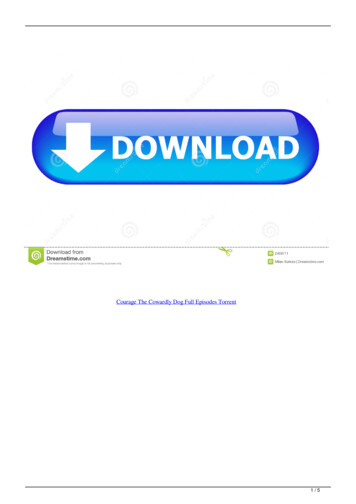
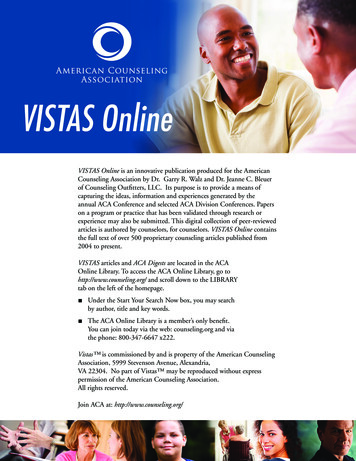
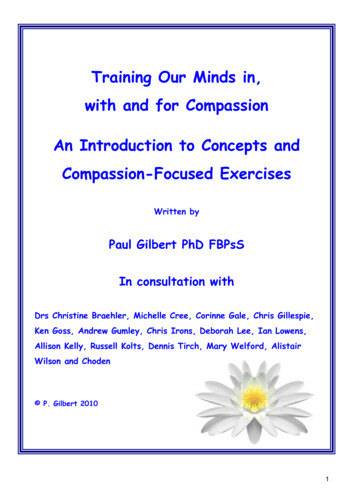
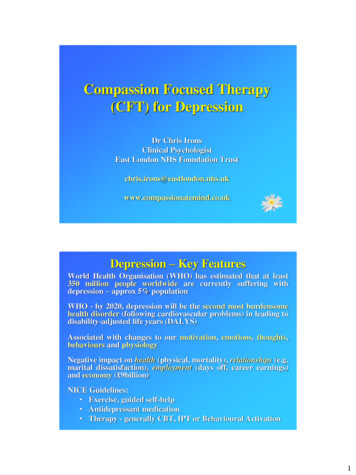
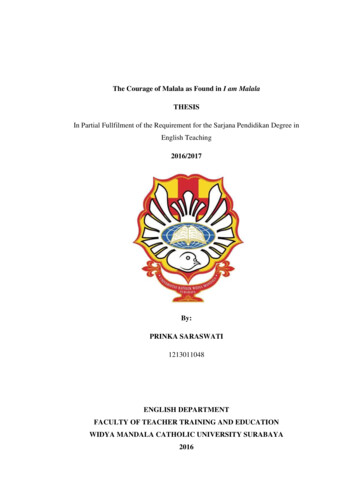
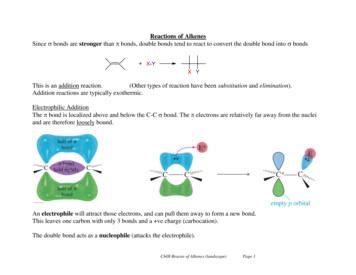
![Radical Healing Syllabus[4] - School of Social Work](/img/36/radical-healing-syllabus-2.jpg)

